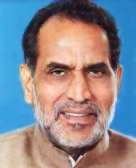 Chandra Shekhar Singh was born on the 1st of July 1927, in a village called Ibrahimpatti of the Ballia district of Uttar Pradesh in India. He was the 9th Prime Minister of the Republic of India. From the year 1962 to 1967, Chandra Shekhar belonged to the Rajya Sabha, the upper house of the Parliament of India and had also undertaken a nationwide padayatra or a walk by foot, in the year 1984, in order to know the country better as he claimed.
Chandra Shekhar Singh was born on the 1st of July 1927, in a village called Ibrahimpatti of the Ballia district of Uttar Pradesh in India. He was the 9th Prime Minister of the Republic of India. From the year 1962 to 1967, Chandra Shekhar belonged to the Rajya Sabha, the upper house of the Parliament of India and had also undertaken a nationwide padayatra or a walk by foot, in the year 1984, in order to know the country better as he claimed.
Chandra Shekhar was born to a family of farmers in Ibrahimpatti in eastern Uttar Pradesh. He did his Master of Arts at Allahabad University. In student politics, Chandra Shekhar was known for his firebrand image. After completing his graduation, he was actively involved in socialist politics. He was influenced by Acharya Narendra Dev, a fiery Socialist leader in the starting of his political career. Chandra Shekhar Singh was a member of the Upper house of the Parliament of India from 1962 to 1967. He went on a nationwide padayatra to know the country better in the year 1984, and he claimed that the padayatra gave the jitters to the then Prime Minister of India, Indira Gandhi.
After Vishwanath Pratap Singh, his predecessor, resigned, he broke away from the Janata Dal, and formed a new party known as the Samajwadi Janata Party (Rashtriya). The Indian National Congress supported his government in order to avoid snap elections, and thus Chandra Shekhar enjoyed a bare majority in a coalition with the BJP and the Communist parties. The relationship between Shekhar and Congress soon crumbled since the Congress party blamed him of spying on their leader Rajiv Gandhi at that time. Thus, the Congress Party boycotted Parliament and as the faction of Chandra Shekhar had only 60 MPs, he resigned from his post in a televised address to the nation on the sixth of March 1991. He however remained in office till the national elections could be held in the later half of the year.
Chandra Shekhar was remembered for his strict adherence to the parliamentary conventions and he was also honoured with the inaugural Outstanding Parliamentarian Award in the year 1995. He was a member of the Lower House of the Parliament of India, Lok Sabha and also led the Samajwadi Janata Party (Rashtriya) or Socialist People`s Party (National). Starting in the year 1977, he was elected to the Lok Sabha eight times from the constituency of Ballia in eastern Uttar Pradesh and the only time he lost was in the year 1984 against Mr. Jagganath Chaudhary of Congress (I) when a massive sympathy wave for Indira Gandhi led to a near elimination of the opposition Parliamentarians.
Chandra Shekhar Singh was suffering from multiple myeloma, a type of plasma cell cancer. On the 3rd of May 2007, he was admitted into a hospital under critical condition and died at the age of eighty on the 8th of July 2007. Chandra Shekhar was survived by his two sons and one of them known as Neeraj Shekhar contested and became victorious in the Ballia Lok Sabha seat which became empty after the death of his father Chandra Shekhar Singh.






